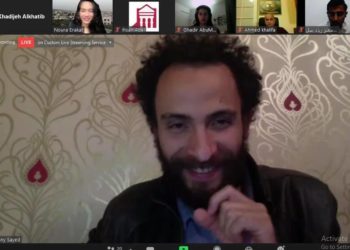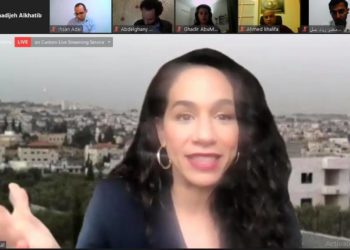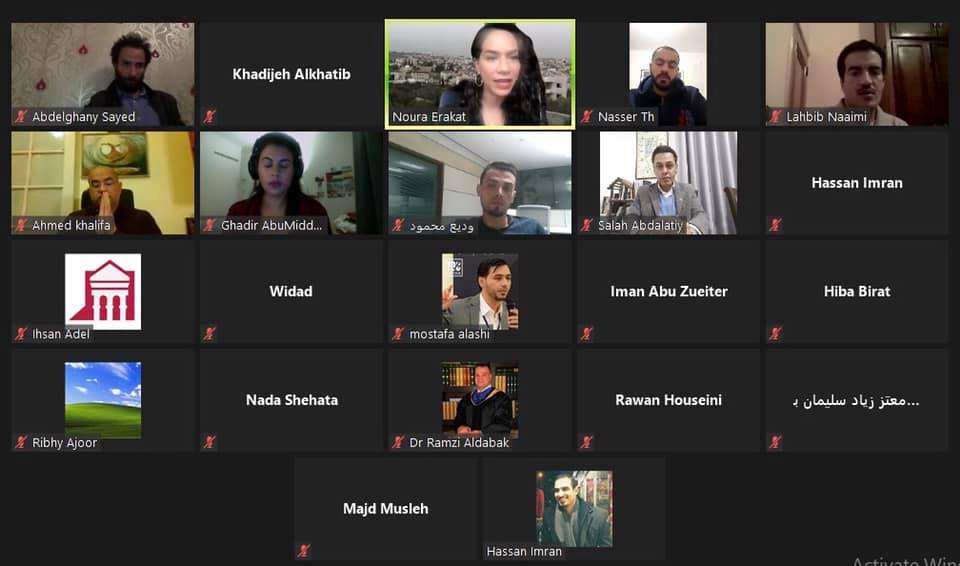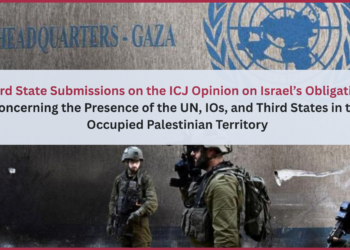United Kingdom-21/2/2021: “Law for Palestine” organized a new panel discussion within the monthly webinars of its “Jurists for Palestine Forum”. The panel discussion, which was titled “International Law and Palestine: a pathway for justice or a tool of distraction”, discussed several critical questions regarding the role of international law in Palestine. Among these was whether the law can serve the accountability and ending the Israeli occupation in Palestine, where to draw the line in the power versus Justice dilemma of the law, and is international law part of the solution or part of the problem in Palestine?
The panel discussion was held on Tuesday 16 February 2021 via Zoom and hosted the international human rights attorney Noura Erekat, an assistant professor at Rutgers University (USA), a visiting fellow researcher at Harvard University (UK), co-founder of “Jadaliyya” ezine, and a policy advisor at “Al-Shabaka” website.

The discussion was moderated by the legal specialist and PhD candidate at Kent Law School (UK), Mr. Abdelghany Sayed, who began the webinar by quickly introducing Erekat’s book “Justice for Some: Law and the Question of Palestine”. Sayed mentioned that the book sheds the light on the extent to which international law can serve the Palestinian question. He also indicated that the book might be a useful source to find answers to the latest questions raised by the International Criminal Court’s recent ruling on its jurisdiction over the Palestinian Occupied Territories.
Over the course of an hour and forty minutes, the webinar’s 23 participants of legal researchers and experts discussed together with Ereka the power of international law in Palestine and whether it is a tool of justice for all or a tool in the hands of the grand powers. The webinar was watched by the 400 Jurists for Palestine Forum’s members from around the globe.
The Law is Power: This Power cannot be isolated from Politics.
Erekat began her speech by stressing out the repeated Israeli violations and crimes against the Palestinians. She emphasized that the law is power, and in order for Palestinians to benefit from this power in liberation, it must be used in light of the political context surrounding it. She said that even though the law in itself is fixed in its terms and articles, the meanings of these are derived from the balance of military and economic powers and the international context during the specific time in question, which altogether give the legal texts their desired meanings at that time.
Erekat stated that over the past century, international law served Israel more than it did for Palestinians. This was through strengthening the colonial interests on the Palestinian lands, as the goal was more land and fewer Palestinians.

Erekat noted that making the law an effective tool in the hands of the Palestinians cannot be achieved by Palestinians only raising it in their speeches, but rather through putting it in the correct political context and striving to apply it within what is actually happening rather than within what must happen. Erekat added that this was the way that “Israel followed and led to its success in establishing its settlement project, not in violation of international law but through international law. Mainly through manipulating the international law texts to support a legal presence on the Palestinian lands”.
Among the challenges that the Palestinians are also facing when trying to use international law, according to Erekat, is the Israeli American policy of delegitimizing the law when the Palestinians try to use it to defend themselves.
The attendees discussed with Erekat the obstacles that the Palestinians face in their liberation movement and how to use the law as a tool to achieve justice and freedom, as well as the role of the scheduled Palestinian parliamentary and presidential elections in serving the Palestinian case internationally. This is besides discussing the strategies that Palestinian civil society organizations and political parties can follow in order to achieve justice through using international law.
This webinar comes within the monthly activities of the Jurists for Palestine Forum, affiliated to the Law for Palestine Organization. The Forum is holding online monthly webinars gathering international experts and researchers, students, jurists and people interested in Palestine from different countries of the world to discuss topics and developments related to international law and Palestine, in addition to effectively networking between jurists interested in Palestine from all over the world.
* To attend the next monthly webinars of Jurists for Palestine Forum, you can register via the following link “here“





